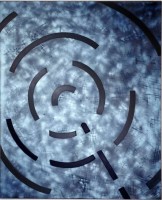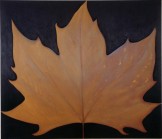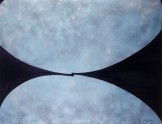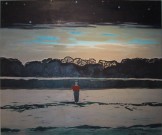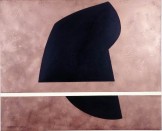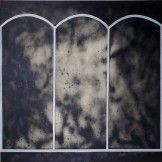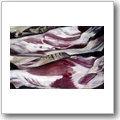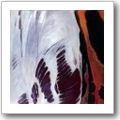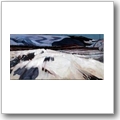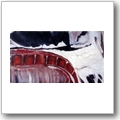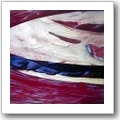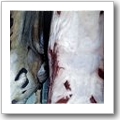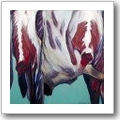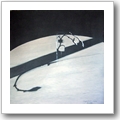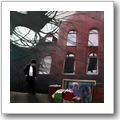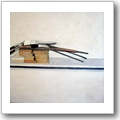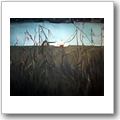Fembio Specials Women Artists - an Exhibition by Almut Nitzsche and FemBio e.V Gabriele von Glasow
Fembio Special: Women Artists - an Exhibition by Almut Nitzsche and FemBio e.V
Gabriele von Glasow

born 12 May 1928 in Partheinen, East Prussia
died 24 July 2004 in Hannover
German painter, singer and professor of voice
85th birthday on 12 May 2013
Biography • Quotes • Literature & Sources
Biography
Gabriele von Glasow was the second of five daughters and two sons of the East Prussian landowner Ernst von Glasow and his wife Charlotte, née von Berg, and grew up on the estate Partheinen near the Frisches Haff. Like her siblings she attended the village school for two years and was then taught by a private tutor. From the age of ten she went to a girls' high school in Königsberg and lived in a boarding house during the week.
Even as a child Gabriele was constantly occupied with drawing—probably inherited from her artistically gifted father, whose gigantic fresco (some 30 by 80 meters), completed after his return from American prisoner of war camp, can still be seen in the county building in Vechta.
Gabriele von Glasow remembers her childhood and youth with deep gratitude: “Our parents loved us very much, left us a lot of freedom, and encouraged each of us according to our talents.” When Gabriele's irrepressible artistic ability became evident, her parents sent her to a boarding school in the city of Weimar, known for its rich artistic culture; here she received instruction in drawing from a painter. “But then an accident occurred,” von Glasow recalls, “which caused me to switch from art to the world of singing.” The fifteen-year-old fell passionately in love with Lotte Müksch, the young dramatic soprano of the Weimar Opera and, since she couldn't get close to her in any other way, decided at least to follow in her footsteps. Gabriele now travelled once a week to Jena for voice lessons, for which her devoted parents obligingly paid, although somewhat bewildered by their daughter's sudden change of mind. To be sure, Gabriele did still continue her drawing lessons as well.
All this took place as the Second World War was heading ever more relentlessly toward total catastrophe for Germany. Gabriele's father had served as a lieutenant colonel on the eastern front, but was transferred to the western front and soon after the Allied landing in Normandy ended up in American captivity, from which he did not return until much later. Her parents had told the family—by now widely scattered—to try to escape to relatives in Vechta if flight should become necessary. So, after her school had hastily awarded its pupils an emergency “Abitur” (graduation certificate), the sixteen-year-old Gabriele fled the advancing Russian army, travelling by train from Weimar to the Oldenburg region, a trip which took her eight days.
Like so many families from the landed aristocracy of East Prussia, the von Glasows had lost literally everything. Their relatives gave them the use of a small house on their estate. Charlotte von Glasow's efforts kept the family's head above water—no one knew anything at first about the father's whereabouts.
After much practice in surviving hard times Gabriele, by now twenty, was finally able to take up her study of singing at the Folkwangschule in Essen. Her teacher was the distinguished voice professor Hilde Wesselmann, who remained a close friend for over fifty years. Since the department of fine arts was in the same building it was an easy matter for von Glasow to continue her training in drawing and painting as well.
Opera was in fact still Gabriele von Glasow's professional goal, but events intervened: Hilde Wesselmann was taken seriously ill and asked her student von Glasow to take over her concerts and teaching obligations. Although von Glasow did have a brief engagement with the Bonn Opera in the 1950's, her appearances in concerts and oratorios would dominate her singing career. She recalls with particular pleasure her performances of the St. Matthew and St. John Passions with the “Thomaner” choir in Leipzig under the direction of the late St.-Thomas cantor Günther Ramin.
The pianist Sebastian Peschko, who directed a “Lieder”-class in Hanover, recommended a young Chilean singer, Mayling Konga, to Hilde Wesselmann in the mid-1960's. Through this connection Gabriele met her companion Mayling; their loving partnership has lasted now almost forty years.
In 1968 Prof. Felix Prohaska brought Gabriele von Glasow to the Hochschule für Musik und Theater in Hanover, where she taught under his successor, Prof. Dr. Richard Jakoby, for 21 years as professor of voice. At 61 von Glasow took early retirement, so that she could finally have more time for painting.
At first painting was an obsession for her—after all she had had to neglect this side of her creative talent for over forty years. The impetus for her burning desire to paint came from a television broadcast about the English artist Francis Bacon, since deceased, that she had tuned into purely by chance. Francis Bacon is best known in Germany for his unsettling images of screaming popes in glass cases. “A silence you can hear and grasp with your hands,” says von Glasow.
Besides Bacon Gabriele von Glasow lists Piero della Francesca, Velázquez, Masaccio, and Gerhard Richter as her models.
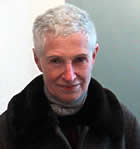 At the end of the 1970's Gabriele von Glasow was treated for breast cancer, and twenty years later, in 1998, she experienced a recurrence. Her friends feared the worst, but von Glasow survived this episode as well with her characteristic determination and courage. She has already produced a huge œuvre of over 100 large paintings (many with the format 1.65 by 1.65 meters), but that is only a fraction of what she has in mind to create – after all, she has forty years to make up for. This delicate, graceful woman with the soft, gray-and-white hair (close-cropped and woolly after her many chemo treatments) celebrated her 75th birthday on May 12, 2003. For fifteen years now Gabriele has descended each day to her basement studio on Podbielskistraße; here she can paint to her heart's content – usually many hours a day – and regularly loses track of the time.
At the end of the 1970's Gabriele von Glasow was treated for breast cancer, and twenty years later, in 1998, she experienced a recurrence. Her friends feared the worst, but von Glasow survived this episode as well with her characteristic determination and courage. She has already produced a huge œuvre of over 100 large paintings (many with the format 1.65 by 1.65 meters), but that is only a fraction of what she has in mind to create – after all, she has forty years to make up for. This delicate, graceful woman with the soft, gray-and-white hair (close-cropped and woolly after her many chemo treatments) celebrated her 75th birthday on May 12, 2003. For fifteen years now Gabriele has descended each day to her basement studio on Podbielskistraße; here she can paint to her heart's content – usually many hours a day – and regularly loses track of the time.
(based on an interview with Gabriele von Glasow on 19 March 2003; trans. Joey Horsley)
Supplement: Gabriele von Glasow died on July 24nd, 2004 in Hannover.
Author: Luise F. Pusch
Quotes
Please click on the pictures to enlarge them
Literature & Sources
Please click on the pictures to enlarge them
If you hold the rights to one or more of the images on this page and object to its/their appearance here, please contact Fembio.





